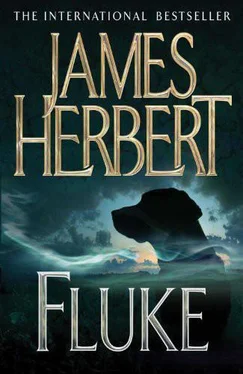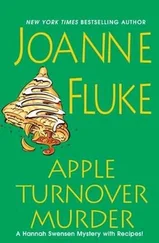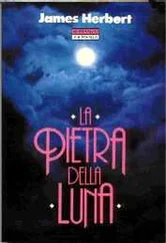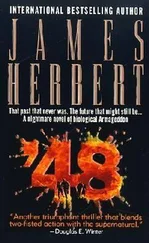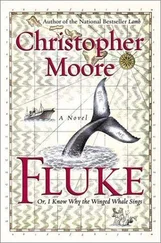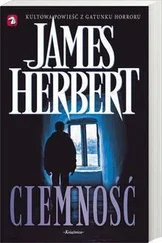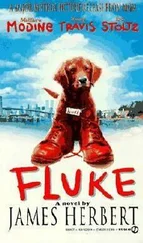James Herbert - Fluke
Здесь есть возможность читать онлайн «James Herbert - Fluke» весь текст электронной книги совершенно бесплатно (целиком полную версию без сокращений). В некоторых случаях можно слушать аудио, скачать через торрент в формате fb2 и присутствует краткое содержание. Город: London, Год выпуска: 2003, ISBN: 2003, Издательство: Hodder & Stoughton, Жанр: Ужасы и Мистика, на английском языке. Описание произведения, (предисловие) а так же отзывы посетителей доступны на портале библиотеки ЛибКат.
- Название:Fluke
- Автор:
- Издательство:Hodder & Stoughton
- Жанр:
- Год:2003
- Город:London
- ISBN:0-450-03432-1
- Рейтинг книги:5 / 5. Голосов: 1
-
Избранное:Добавить в избранное
- Отзывы:
-
Ваша оценка:
- 100
- 1
- 2
- 3
- 4
- 5
Fluke: краткое содержание, описание и аннотация
Предлагаем к чтению аннотацию, описание, краткое содержание или предисловие (зависит от того, что написал сам автор книги «Fluke»). Если вы не нашли необходимую информацию о книге — напишите в комментариях, мы постараемся отыскать её.
Fluke — читать онлайн бесплатно полную книгу (весь текст) целиком
Ниже представлен текст книги, разбитый по страницам. Система сохранения места последней прочитанной страницы, позволяет с удобством читать онлайн бесплатно книгу «Fluke», без необходимости каждый раз заново искать на чём Вы остановились. Поставьте закладку, и сможете в любой момент перейти на страницу, на которой закончили чтение.
Интервал:
Закладка:
Polly chased after me, her laughter beautiful to my ears. I skidded to a halt when I reached the kitchen and my eyes drank in the room, the memories returning like old friends from an outing: the huge old black fireplace with its iron oven, a relic of the past which we decided to preserve; the round pine table, deliberately scored and scratched with initials, noughts and crosses, I LOVE YOUs and HAPPY BIRTHDAYs, and any messages we cared to mark for posterity; the antique clock which always informed us the time was a quarter to four, but did so in such an elegant way; the blue-and-yellow vase on the window-sill that looked as if it had been made up from a jigsaw, the result of my patiently piecing it together after Polly had knocked it on to the floor in her ‘just-about-walking’ days. There were new items around the kitchen, of course, but these seemed alien, an intrusion upon a memory. I sighed, ready to burst into tears again, but a hand grabbed my collar and interrupted my nostalgia.
‘Let’s just see who you belong to,’ Carol said, tugging the nameplate round into view. ‘Fluke? Is that your name?’
Polly cupped a hand to her mouth and tittered.
‘No address? Nobody wants you, do they?’ Carol said, shaking her head.
I shook my own head in agreement.
‘Can we keep him?’ Polly said excitedly.
‘No,’ was Carol’s firm reply. ‘We’ll take it to the police station tomorrow and see if it’s been reported missing.’
‘But can we keep him if no one wants him?’
‘I don’t know, we’ll have to ask Uncle Reg.’
Uncle Reg? Who was he?
Polly seemed pleased enough with that and began to run her fingers down my back. ‘Can we feed Fluke, Mummy? I’m sure he’s very hungry.’
‘Let’s see what we’ve got for it, then.’
Please call me him, or he, Carol, not it. I’m not an it. I prefer Fluke to it. I prefer Horace to it.
Carol went to a freezer, a new item in the kitchen, and looked thoughtfully into it. ‘I’m sure you’d like a leg of lamb or some nice juicy steak, wouldn’t you, Fluke?’
I nodded, licking my lips in anticipation, but she closed the freezer and said to Polly, ‘Run down to the shop and buy a tin of dogfood. That should keep him happy until tomorrow.’
‘Can I take Fluke with me, Mummy?’ Polly jumped up and down at the prospect and I began to get excited at her excitement.
‘All right, but make sure he doesn’t run out into the main road.’
So off we set, my daughter and I, girl and dog, down the lane that led to the main road and the village’s only shop. We played as we went and for a while I forgot I was Polly’s father and became her companion. I stayed close to her skipping feet, occasionally jumping up to pull at her cardigan, licking her face anxiously once when she tripped and fell. I tried to lick her grazed knees clean, but she pushed me away and wagged a reprimanding finger. While she was buying my dinner in the grocery I stayed on my best behaviour, refusing to be tempted by the pile of within-easy-reach packets of potato crisps, ‘all flavours’. We raced back down the lane and I let her beat me for most of the way, hiding behind a tree when she reached the garden gate. She looked around, bewildered, and called out my name; I remained hidden, snickering into the long grass at the base of the tree. I heard footsteps coming back down the lane and, when she drew level with my hiding-place, raced around the other side, scooting towards the gate. Polly caught sight of me and gave chase, but I was an easy winner.
She reached me, giggling and breathless, and threw her arms around my neck, squeezing me tight.
We went into the house — my home — and Polly told Carol everything that had happened. Half the tin of dogfood was poured on to a plate and placed on the floor, together with a dish full of water. I buried my nose in the meat and cleared the plate. Then I cleared the dish. Then I begged for more. And more I got.
Everything was rosy. I was home, I was with my family. I had food in my belly and hope in my heart. I’d find a way of letting them know who I was, and if I couldn’t… well, did it matter that much? As long as I was with them, there to protect them, there to keep the mysterious stranger at bay, my true identity wasn’t that important. I wasn’t worried about the police station tomorrow, for there’d be no one to claim me, and I was sure I could ingratiate myself enough for them to want to keep me. Yes, everything was rosy.
And you know how things have a habit of turning nasty for me just at their rosiest.
We’d settled down for the night (I thought). Polly was upstairs in bed, Carol was relaxed on the settee, her legs tucked up beneath her as she watched television, and I lay sprawled on the floor below her, my eyes never leaving hers. Occasionally, she would look down at me and smile, and I would smile back, breathing deep sighs of contentment. Several times I tried to tell her who I was, but she didn’t seem to understand, telling me to stop grizzling. I gave up in the end and succumbed to the tiredness that had crept up on me. I couldn’t sleep — I was too happy for that — but I rested and studied my wife’s features with adoring eyes.
She’d aged slightly, lines at the corners of her eyes and at the base of her neck where there’d been no lines before. There was a sadness about her, but it was a well-hidden inner sadness, one you had to sense rather than see; it was obvious to me why it was there.
I wondered how she had coped without me, how Polly had accepted my death. I wondered about my own acceptance of the badger’s pronouncement that I certainly was dead as a man. The lounge still contained all the cosiness I remembered so well, but the atmosphere of the whole house was very different now. Part of its personality had gone, and that was me. It’s people who create atmosphere, not wood or brick, nor accessories — they only create surroundings.
I had looked around for photographs, hoping to catch a glimpse of my past image, but to my surprise had found none on display. I racked my brain to remember if ever there had been any framed photographs of myself around, but as usually happens whenever I try consciously to remember, my mind became a blank. Perhaps they had been too painful a reminder to Carol and Polly and had been put away somewhere to be taken out only when they could cope.
Whether my plastics business had been sold or was still running I had no way of knowing, but I was relieved to see my family seemed to be under no great hardship. Various household items confirmed this: the freezer in the kitchen, the new television set here in the lounge, various odd items of furniture scattered about the house.
Carol was still as attractive as ever, despite the telltale lines; she’d never been what you might call beautiful, but her face possessed a quality that made it seem so. Her body was still an inch away from plumpness all round, as it always had been, her legs long and gracefully curved. Ironically, for the first time as a dog, I felt physical feeling stir, a hunger aroused. I wanted my wife, but she was a woman and I was a dog.
I quickly turned my thoughts towards Polly. How she’d grown! She’d lost her baby chubbiness but retained her prettiness, fair skin and darkening hair emphasising her small, delicately featured face. I was surprised and strangely moved to see her don brown-rimmed spectacles to watch television earlier on in the evening; it seemed to make her even more vulnerable somehow. I was pleased with her; she’d grown into a gentle child, with none of the petulance or awkwardness so many of her age seemed to have. And there was a special closeness between her and her mother, perhaps a closeness born out of mutual loss.
As I had noticed before, she appeared to be about seven or eight, and I pondered over the question of how long I had been dead.
Читать дальшеИнтервал:
Закладка:
Похожие книги на «Fluke»
Представляем Вашему вниманию похожие книги на «Fluke» списком для выбора. Мы отобрали схожую по названию и смыслу литературу в надежде предоставить читателям больше вариантов отыскать новые, интересные, ещё непрочитанные произведения.
Обсуждение, отзывы о книге «Fluke» и просто собственные мнения читателей. Оставьте ваши комментарии, напишите, что Вы думаете о произведении, его смысле или главных героях. Укажите что конкретно понравилось, а что нет, и почему Вы так считаете.
